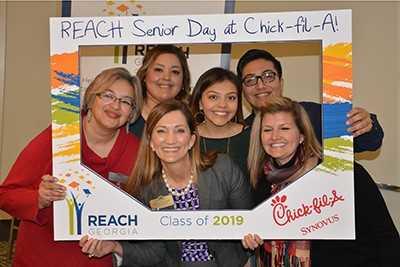
May 2019 Quarterly Newsletter
FY 2020 State Program Updates Now Available
The 2019 Legislative Session included several bills related to the programs GSFC administers. Learn more about the details on the program and regulatory changes so you're ready for the upcoming year.
2019 – 2020 State Program Regulations Updates
The Program Regulations are effective July 1, 2019 and awards are effective Fall term 2019. The FY 2020 Program Regulations include clarifications, revisions and changes made due to legislation passed during the 2019 session of the Georgia General Assembly and as a result of feedback and suggestions from our postsecondary partners. Listed below are several award amount and regulatory changes that affect the administration of the state programs. Please review the FY 2020 Program Regulations for all revisions.
- A three percent increase is approved for HOPE Scholarship – Public and Private Institutions and HOPE Grant institutions, effective Fall term 2019 (FY 2020) (HB 31).
- A $500 per semester/$375 per quarter increase is approved for Zell Miller Scholarship – Private Institutions, effective Fall term 2019 (FY 2020) (HB 31).
- A ten-year expiration of eligibility limit for students who receive their first HOPE or Zell Miller Scholarship payment in Summer term 2019 (FY 2020) or later (HB 218).
- Effective Fall term 2019 (FY 2020), Dual Enrollment award rates for tuition, mandatory fees and book costs will be published annually by GSFC. Rates for tuition, mandatory fees and book allowance may vary based on course type, course delivery method, institution sector, or term of enrollment.
- Eligible Postsecondary Institutions must adhere to the Dual Enrollment award rates published annually; accept award amount as full payment of tuition, mandatory fees and book costs up to the 15 semester or 12 quarter credit hours per term limit.
- The REACH Program is being codified into law, though provisions are subject to available funding (SB 83):
- Participating School Systems with five or more high schools may be approved to select up to twelve scholars annually. School Systems will be notified annually of the approved funds in the Annual Student Selection Approval form.
- The proportionate share of funding required to be provided by the Participating School Systems has been revised and will be based on available funding. For scholars in the 2019-2020 Cohort from participating school systems the rate is based on the Georgia Department of Community Affairs (DCA) Job Tax Credit tier designation and has been revised.
Award Charts
The 2019 – 2020 Program Regulations and award charts are now available. Printable award charts are available on GAfutures.org Refer to DCL ID: 2020-01 for more information on program updates as well as invoicing deadlines.
Dual Enrollment Update
Perhaps just as important as the bills that passed were those that did not receive final passage, including House Bill 444 related to Dual Enrollment. GSFC worked very closely with the Governor’s office and members of the General Assembly to update the program to provide more intentionality and to control the rapid growth of expenditures. Ultimately, however, no agreement was reached on the policy changes that would provide more program structure and control costs, while maintaining access for specific student groups.
GSFC is now tasked with administering the Dual Enrollment program within the available state program budget of approximately $100M, even though our original projections indicated more than $125M is required to meet demand and student participation. Since the end of the legislative session, we have worked with the Governor’s Office of Planning and Budget to evaluate possible regulatory changes within our statutory authority that could assist in balancing the program budget by cutting expenses by $25M.
Accordingly, GSFC will implement a change to the award rates paid on behalf of Dual Enrollment students. Beginning in the Fall term 2019 (FY 2020), the payment rate for book and fee awards will be $0. Updated award charts will be posted online by May 14, 2019.
While we recognize the impact this may have on your institutions, this action will minimize the direct impact to students and not directly eliminate any one or more student groups from participation. Additionally, this will allow for continued discussions with policy makers and our partners in the coming months regarding more substantive policy changes that will ensure longer term program sustainability.
Please note that institutions must still accept payment from GSFC as full payment for Dual Enrollment students and will not be permitted to charge mandatory fees or book charges to students.
Reminder
High Schools: Deadline to Upload Final Transcripts June 30
If complete transcript data is successfully uploaded for 9th graders (including the student’s Social Security number), beginning their 10th grade year, they should be able to view their HOPE GPA through their My GAfutures account. My High School HOPE GPA provides students with not only their HOPE GPA, it also allows students to view completed academic rigor courses and their highest ACT/SAT score. These are other factors that determine a student’s HOPE eligibility. A student’s high school HOPE GPA is determined from the most recently uploaded transcript provided by their high school.
REACH Class of 2019 Celebrated at Chick-fil-A Senior Day
Members of the REACH Class of 2019 participated in a special day hosted by Chick-fil-A to celebrate their accomplishments and help prepare them for the next steps as they head off to college.
Nearly 70 members of the REACH Scholar Class of 2019

participated in the first REACH Senior Day hosted by Chick-fil-A on Thursday, March 7. The event, which was presented by Synovus, gave students the opportunity to meet and greet other REACH Scholars and engage in small group and panel style discussions with education professionals and REACH college students. Topics included college and career planning, next steps, and what to expect from their postsecondary experience.
Melanie, a REACH senior Scholar from Forsyth County who plans to attend Kennesaw State University in the fall, thought it was a wonderful opportunity. “I really enjoyed being in the same room as everyone who is in a very similar situation as me. It made me feel more comfortable about my transition from high school to college. I also enjoyed the small group discussions where everyone answered all of our questions and concerns about specific colleges.”
Students also received special recognition from First Lady Marty Kemp. Mrs. Kemp, along with GSFC President Caylee Noggle and REACH Board Chair Anne Kaiser, presented each Scholar with an honor cord for their participation in the REACH program. “I was honored to participate in the REACH Senior Day with these bright and talented students,” said Mrs. Kemp. “I wish them all the best as they continue throughout the REACH program and all their future endeavors.”
In addition, superintendents, REACH coordinators, mentors, academic coaches and other special guests from around the state were on hand to help celebrate these outstanding students.
Caylee Noggle Confirmed President of GSFC
GSFC’s Caylee Noggle, who has been serving as Interim President, was recently confirmed the agency’s President.
Upon a formal recommendation by Governor Brian P. Kemp, GSFC’s Board of Commissioners voted unanimously to have Mrs. Noggle assume the role, where she will also serve as President of the Georgia Student Finance Authority (GSFA) and the Georgia Higher Education Assistance Corporation (GHEAC). Read the official press release to learn more.
The Georgia General Assembly Wraps Up 2019 Session
The Georgia General Assembly adjourned “Sine Die” on Tuesday, April 2 bringing the 2019 legislative session to a close. Just as it began, it was a busy day at the Capitol, as both the House and Senate worked late into the night on the final day.

Governor Brian P. Kemp recently signed legislation that impacts some of the financial programs and services GSFC administers to help increase access to higher education.
- HB 31: The FY 2020 budget provides for the following increases to GSFC-administered programs:
- HOPE Grant – 3% increase
- HOPE Scholarships (Public & Private Institutions) – 3% increase
- Zell Miller Scholarships (Private Institutions) - $2,308 to $2,808 for semester systems and $1,539 to $1,914 for quarter systems.
- Additional funding to expand the REACH Georgia Scholarship
- HB 218: Extends the time eligibility for HOPE and Zell Miller Scholarships from seven years to 10 years after high school graduation for those that received their first award Summer term 2019 or later.
- HB 562: Codifies the Realizing Educational Achievement Can Happen (REACH) Scholarship.
- HB 266: Increases the tax deduction for contributions to Path2College 529 plans.